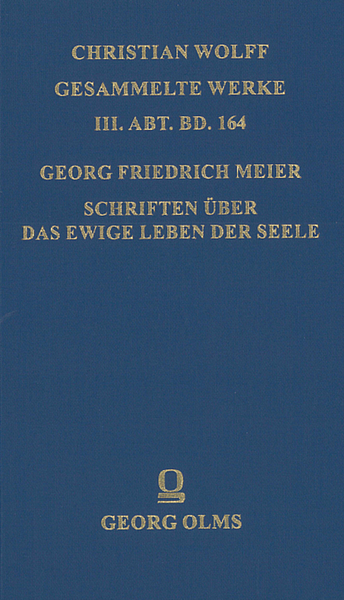Rumore
Schriften über das ewige Leben der Seele
ISBN 978-3-487-16070-2
englischWith an introduction by Paola Rumore
The “Beweis daß die menschliche Seele ewig lebt” and the later “Vertheidigungen” present Georg Friedrich Meier’s fundamental contribution to one of the most prominent philosophical debates of 18th-century Germany. In these writings Meier revises the main claims of his earlier “Gedancken von dem Zustande der Seele nach dem Tode” (1746), where he had rejected the validity of any rational demonstration of the immortality of the soul. The work immediately provoked a lively and, in many cases, polemical discussion; Meier was accused of having provided ‘theoretical legitimacy’ or ‘patronage’ to materialists, since he claimed that their denial of immortality did not necessarily imply atheism or a threat to morality. Alongside such indignant reactions, some contemporaries welcomed Meier’s implicit invitation to improve the arguments of rational psychology; among them his friend Lange proposed a mathematical demonstration of immortality that convinced Meier to return to the subject. The “Beweis” and “Vertheidigungen” reprinted here present Meier’s new position on the issue. A position which, while revising the earlier conviction about the inability of reason to demonstrate the immortal nature of the soul, should not be understood as a mere retraction. Rather, it represents a further step forward in Meier’s reflection on the role of philosophy in its relationship with faith in the age of the Enlightenment.
Mit einer Einleitung von Paola Rumore
Der „Beweis daß die menschliche Seele ewig lebt“ und die späteren „Vertheidigungen“ stellen Georg Friedrich Meiers grundlegenden Beitrag zu einer der prominentesten philosophischen Debatten der deutschen Aufklärung dar. In diesen Schriften revidiert Meier die Hauptaussagen seiner früheren „Gedancken von dem Zustande der Seele nach dem Tode“ (1746), wo er die Gültigkeit jedes rationalen Beweises für die Unsterblichkeit der Seele abgelehnt hatte. Das Werk löste sofort eine lebhafte – und in vielen Fällen polemische – Diskussion aus; Meier wurde vorgeworfen, den Materialisten eine Art ‚theoretische Legitimation‘, eine ‚Patronage‘, verschafft zu haben, da er behauptete, ihre Leugnung der Unsterblichkeit bedeute nicht zwangsläufig eine atheistische Ausrichtung oder eine Bedrohung der Moral. Neben solchen empörten Reaktionen, begrüßten einige Zeitgenossen die implizite Aufforderung, die Argumente der rationalen Psychologie zu verbessern; unter ihnen auch Meiers Freund Lange, der eine mathematische Demonstration der Unsterblichkeit vorschlug, die Meier davon überzeugte, auf das Thema zurückzukommen. Die hier abgedruckten Schriften stellen Meiers neue Position zu diesem Thema dar. Eine Position, die zwar seine frühere Überzeugung von der Unfähigkeit der Vernunft, die Unsterblichkeit der Seele zu beweisen, revidiert, die aber nicht als eine bloße Zurücknahme verstanden werden sollte. Vielmehr stellt sie einen weiteren Schritt vorwärts in Meiers Überlegungen zur Rolle der Philosophie in ihrem Verhältnis zum Glauben im Zeitalter der Aufklärung dar.


